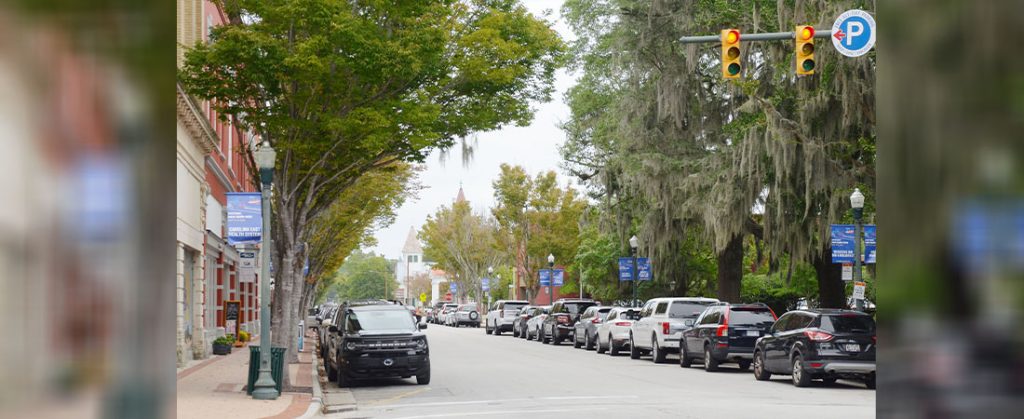
A public hearing has been set to address a longstanding parking issue for downtown New Bern businesses that stretches back decades.
During their September 26 meeting, the New Bern Board of Aldermen voted 5-1 to call a public meeting for October 10 to consider amending section 15-343 — “Flexibility in Administration Required” of the city code of ordinances. The proposed changes would expand the downtown area’s exempted off-street parking area to include real estate to the west side of East Front Street down to the south side of South Front Street.
New Bern’s current land use ordinance requires off-street parking be provided for new commercial developments as well as businesses moving into existing structures and utilizing a “change-of-use” occupancy. New businesses moving into the exempted area would be allowed to occupy an existing building without having to meet parking requirements that could preclude the new use of the building due to a lack of parking spaces.
The public hearing on the off-street parking ordinance will be held during the Board of Aldermen’s October 10 meeting at 6 p.m. at City Hall.
Under the updated ordinance, the downtown zone exempted from off-street parking requirements would be defined as: the area encompassing those properties abutting the east side of Hancock street, the south side of South Front Street, the west side of East Front Street, the south side of Broad Street from the west side of East Front Street to the west side of Craven Street, and the north side of Broad Street from the east side of Craven to the east side of Hancock Street.
The revised ordinance received approval from the New Bern Planning and Zoning Board last month and was sent to the Board of Aldermen for consideration. But the changes received pushback from Planning and Zoning Board member Rusty Ingram, who said he believed more hard data was needed on how many businesses have made the decision not to move into the area because of the downtown parking requirements.
“To me, to make a change like this doesn’t necessarily make sense unless we have hard data that says it makes sense to do this because there are enough businesses and it would create a problem if we didn’t do something,” he commented during the board’s September 13 meeting.
During last week’s Board of Aldermen meeting Aldermen Rick Prill, who voted against the public hearing, also raised concerns about what he described as the “anecdotal data” suggesting that individuals interested in opening businesses in downtown New Bern may be avoiding the area due to the antiquated parking restrictions. Prill requested that the item regarding the public hearing be pulled off the board’s September 26 consent agenda to allow for discussion.
Prill said he agreed with issues raised in an email Ingram sent to each member of the Board of Aldermen.
“This board has seen nothing up to this point of factual data that would support this action being taken at this point in time,” he commented.
Prill said he was concerned that little information had been provided on who was making inquiries or what properties they were interested in downtown.
“We’ve been told that staff has received phone calls from people who were looking at the possibility of relocating a business to New Bern and have inquired about parking, and with the current parking restrictions in place that they essentially have gone away,” he said.
City Attorney Scott Davis said he initially raised concern about the parking ordinance several years ago when it came to his attention that City staff did not have clear direction on how to proceed when a downtown business could not comply with the parking code. He explained that many of the parcels in the area are built “from lot line to lot line, they literally have no real estate for parking spaces.”
Davis explained that when the off-street parking ordinance was adopted decades ago those properties were grandfathered in as existing non-confirming use lots. However, if one of those businesses shuts down for more than six months and the building is empty or the use changes, by law they then have to comply with the land use ordinance.
“Of course that’s a non-starter if you don’t own any real estate on your parcel to put a parking space,” Davis said. “The building will stay vacant until the end of the world, which is obviously an absurd result.”
Davis said when he saw businesses opening up in what had previously been vacant buildings on parcels that had no parking, he realized the ordinance was not being enforced.
“And that leaves us in a very awkward situation where I don’t know how to advise staff as to what to do for the next applicant. Are we going to tell the next person that needs a zoning permit, no?” he asked. “We’re trying to get out in front of this issue where we’ve got non-compliance and we’ve got to have a solution.”
Jessica Rhue, director of Development Services, said both administration and Development Services staff believed there were enough complications associated with parking downtown “that it was time to warrant a study.”
Rhue said the issue was discussed by the Planning and Zoning Board for the first time in May and then at each of their monthly meetings through September before the proposed changes were sent to the Board of Aldermen. She explained that aldermen had a number of options on how to proceed with the recommended update to the ordinance, including approval, sending it back to the Planning and Zoning Board for further direction, or simply allowing the matter to die without a vote.
By Todd Wetherington, co-editor. Send an email with questions or comments.

